Rachel Rossano's Blog, page 14
May 29, 2013
Medieval Word Wednesday - Cobbler versus Shoemaker
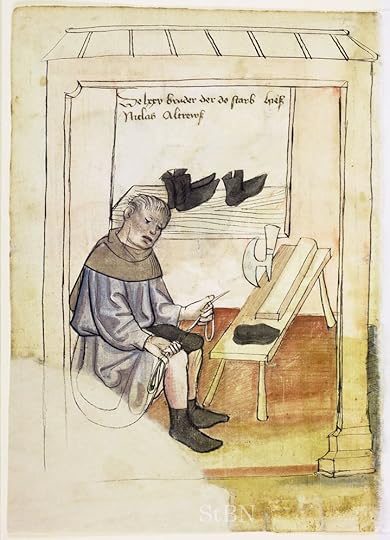 http://commons.wikimedia.org/wiki/Fil...
http://commons.wikimedia.org/wiki/Fil...Contrary to my previous understanding, a cobbler in medieval times did not make shoes. According to The Scriptorium (http://thescriptorium.co.uk/glossary.php), a cobbler was "a repairer of footwear as opposed to a maker of footwear."
I suppose shoemakers made shoes. Unless you wanted really fine shoes.
Then you would seek out a cordwainer. They were makers "of fine shoes using soft Cordovan leather." I was surprised to discover that Cordovan leather is made from horses. Not the horses' hides, but a specific muscle in their hindquarters.
I always thought that leather came from animal hides, not their muscles.
Knowing where they came from, would you seek out a cordwainer to purchase his wares?
Published on May 29, 2013 06:30
May 25, 2013
#SweetSat - Honor (continued from last week)
A few of those who commented on last week's #SweetSat post requested that I not leave them hanging. Just for them, I am going to share more of the same scene from my current WIP Honor.
For those of you who are coming in fresh this week, the section is presented from Lord Dentin's POV. The setting is the outer courtyard of Sir Rathenridge's vargar (castle). Elsa and Barack are sister and brother.
~~~~~
“That is all behind us, Elsa.” (Barack waved away his sister's concern.)
“How can you say that?” She glared at him. “Father hasn’t found a way to make up for the money you lost last June. Sir Konry agreed to overlook your conduct with his daughter, but only barely. One wrong move from you and he will bring you up on charges of–”
“Aren’t you the slightest bit glad to see me?” He spun away from her and came face to face with me. The pathetic pout on his face melted into suspicion. “Who are you?”
Before I could dress the man down for haranguing his sister in such a public manner, Elsa intervened. Laying a hand tentatively on my arm, she rendered me temporarily silent.
“Lord Dentin, may I introduce you to my brother, Barack Reeve? Barack, this is the Earl of Dentin.”At least the boy had the presence of mind to offer me a bow, albeit a sloppy one. “Please to meet you, my lord.” He extended an arm in the direction of his traveling companion. “May I introduce my friend and soon to be brother-in-law, Wilard Naron.”
I nodded to Naron. “We have met before.”
It would be dangerous not to know of the man. His father controlled a quarter of the business interests in the capital, plus many larger enterprises across the nation. It was rumored their family was the richest in the whole country. But I didn’t recall there being a daughter in the family for Barack to wed.
“I say, Barack,” Naron protested. “Isn’t that a bit preemptive?”
“What have you done?” Elsa’s face flushed but she kept her expression guarded.
“Surely you see? Marry Wilard here and all our troubles will be over.”
~~~~~
How do you think Elsa is going to respond? Will she agree?
For more sweet samples, go to http://sweetsatsample.wordpress.com/.
Honor will be the sequel to Duty.
If you are curious about Duty, the story of Tomas and Brielle, it is available on Amazon and Barnes & Noble in ebook and print.
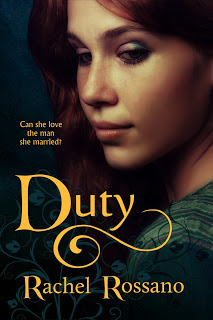
Amazon ~ B&N
For those of you who are coming in fresh this week, the section is presented from Lord Dentin's POV. The setting is the outer courtyard of Sir Rathenridge's vargar (castle). Elsa and Barack are sister and brother.
~~~~~
“That is all behind us, Elsa.” (Barack waved away his sister's concern.)
“How can you say that?” She glared at him. “Father hasn’t found a way to make up for the money you lost last June. Sir Konry agreed to overlook your conduct with his daughter, but only barely. One wrong move from you and he will bring you up on charges of–”
“Aren’t you the slightest bit glad to see me?” He spun away from her and came face to face with me. The pathetic pout on his face melted into suspicion. “Who are you?”
Before I could dress the man down for haranguing his sister in such a public manner, Elsa intervened. Laying a hand tentatively on my arm, she rendered me temporarily silent.
“Lord Dentin, may I introduce you to my brother, Barack Reeve? Barack, this is the Earl of Dentin.”At least the boy had the presence of mind to offer me a bow, albeit a sloppy one. “Please to meet you, my lord.” He extended an arm in the direction of his traveling companion. “May I introduce my friend and soon to be brother-in-law, Wilard Naron.”
I nodded to Naron. “We have met before.”
It would be dangerous not to know of the man. His father controlled a quarter of the business interests in the capital, plus many larger enterprises across the nation. It was rumored their family was the richest in the whole country. But I didn’t recall there being a daughter in the family for Barack to wed.
“I say, Barack,” Naron protested. “Isn’t that a bit preemptive?”
“What have you done?” Elsa’s face flushed but she kept her expression guarded.
“Surely you see? Marry Wilard here and all our troubles will be over.”
~~~~~
How do you think Elsa is going to respond? Will she agree?
For more sweet samples, go to http://sweetsatsample.wordpress.com/.
Honor will be the sequel to Duty.
If you are curious about Duty, the story of Tomas and Brielle, it is available on Amazon and Barnes & Noble in ebook and print.

Amazon ~ B&N
Published on May 25, 2013 05:00
May 22, 2013
Medieval Word Wednesday - Food
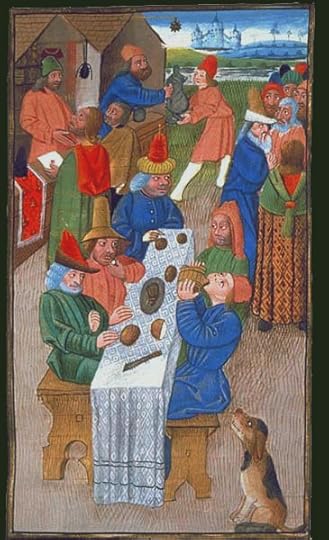 http://commons.wikimedia.org/wiki/File:Medieval_peasant_meal.jpg#filelinks
http://commons.wikimedia.org/wiki/File:Medieval_peasant_meal.jpg#filelinksI have come to the conclusion that I, as a vegetarian, wouldn't survive as a noblewoman in the Medieval time period.
The upper class diet consisted of mainly meat (beef, venison, mutton, pork, poultry, and other game), fish, shell fish, fruit, spices, cheese, and limited number of vegetables (those grown above ground - see http://www.middle-ages.org.uk/middle-ages-food-and-diet.htm). Their main bread was white flour bread called manchet bread (recipe here).
The lower class diet is more to my personal taste. Pottage (a vegetable stew usually containing peas or lentils and other vegetables from the garden - recipe here), dairy products, non-game meats (like beef, pork and lamb), fish (limited by location), homegrown vegetables, homegrown fruit, and herbs. A barley or rye bread would round out the daily meals.
The Medieval Cookery looks like a great resource of recipes. I am looking forward to exploring their archives.
Which diet would suit your culinary tastes?
Published on May 22, 2013 06:00
May 18, 2013
#SweetSat - Honor
Welcome back!
This morning I decided to share a bit of Duty's sequel, Honor, which is my current WIP. This section is presented from Lord Dentin's perspective.
~~~~~
“Elsa!”
My head snapped up. I instinctively turned toward the voice. One of the two young men ran across the courtyard toward a woman, Elsa. Dressed in a serviceable kirtle of brown with a scarf of tan linen emphasizing her small waist and curved hips, she looked like she was just returning from a walk in the gardens. Her look of surprise dissolved into resignation as the strange man approached her. She pulled her black woolen shawl about her shoulders as though it might protect her. The man engulfed her in a huge hug.
She didn’t welcome his embrace, but she also didn’t shove him away. Standing straight and unbending in the circle of his arms, she resisted without repelling. Despite my reservations, I changed direction and added speed. I reached her side just as the man stepped away from her, giving me the first clear view of his face.
“How are mother and father?” He held her at arm’s length.
“Mother is fine.” Elsa’s clipped tone spoke clearly of her anger. “Father, on the other hand, has not arrived. You were supposed to be with him at home.”
He groaned theatrically. “Oh, Elsa, must you always be so disapproving? I have done nothing wrong.” He wilted with obvious drama beneath her pointed glare before brightening again. “Well nothing lately.”
“Barack, you know very well that you were not to leave home until this all blows over. You and father agreed on it. That was the whole reason he didn’t come with us–”
I placed him then. Barack Reeve, dissolute heir to the barony in Malorny. I slowed my approach as I recalled what I knew of the young man.
“That is all behind us, Elsa.”
~~~~~
Do you believe Barack?
For more Sweet Samples, go to: http://sweetsatsample.wordpress.com/
If you are curious about Duty, the story of Tomas and Brielle, it is available on Amazon and Barnes & Noble in ebook and print.

Amazon ~ B&N
This morning I decided to share a bit of Duty's sequel, Honor, which is my current WIP. This section is presented from Lord Dentin's perspective.
~~~~~
“Elsa!”
My head snapped up. I instinctively turned toward the voice. One of the two young men ran across the courtyard toward a woman, Elsa. Dressed in a serviceable kirtle of brown with a scarf of tan linen emphasizing her small waist and curved hips, she looked like she was just returning from a walk in the gardens. Her look of surprise dissolved into resignation as the strange man approached her. She pulled her black woolen shawl about her shoulders as though it might protect her. The man engulfed her in a huge hug.
She didn’t welcome his embrace, but she also didn’t shove him away. Standing straight and unbending in the circle of his arms, she resisted without repelling. Despite my reservations, I changed direction and added speed. I reached her side just as the man stepped away from her, giving me the first clear view of his face.
“How are mother and father?” He held her at arm’s length.
“Mother is fine.” Elsa’s clipped tone spoke clearly of her anger. “Father, on the other hand, has not arrived. You were supposed to be with him at home.”
He groaned theatrically. “Oh, Elsa, must you always be so disapproving? I have done nothing wrong.” He wilted with obvious drama beneath her pointed glare before brightening again. “Well nothing lately.”
“Barack, you know very well that you were not to leave home until this all blows over. You and father agreed on it. That was the whole reason he didn’t come with us–”
I placed him then. Barack Reeve, dissolute heir to the barony in Malorny. I slowed my approach as I recalled what I knew of the young man.
“That is all behind us, Elsa.”
~~~~~
Do you believe Barack?
For more Sweet Samples, go to: http://sweetsatsample.wordpress.com/
If you are curious about Duty, the story of Tomas and Brielle, it is available on Amazon and Barnes & Noble in ebook and print.

Amazon ~ B&N
Published on May 18, 2013 05:00
May 15, 2013
Medieval Word Wednesday - Sumptuary Laws
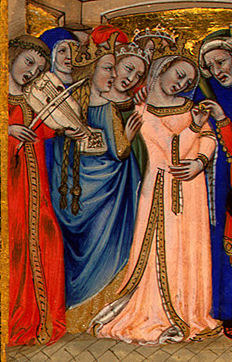 http://commons.wikimedia.org/wiki/Fil...
http://commons.wikimedia.org/wiki/Fil...Sumptuary Laws - laws intended to restrain or limit the expenditure of citizens in apparel, food, furniture, etc.; laws which regulate the prices of commodities and the wages of labor; laws which forbid or restrict the use of certain articles, as of luxurious apparel.
(Source: The Free Dictionary, http://www.thefreedictionary.com/Sumptuary+laws)
Imagine someone telling you what kinds of clothing you could buy and fining you for wearing something that doesn't fit the law's restrictions. During the Medieval period, that was just what kings did. Frequently, they passed sumptuary laws so that the social status of a person could be easily discerned by their clothing. Some of the laws were for other reasons like promoting local commerce and cutting down on imports.
From The Medieval Life and Times website:
The English Sumptuary Law of 1363: The sumptuary legislation passed in 1363 included the following:
Women were, in general, to be dressed according to the position of their fathers or husbandsWives and daughters of servants were not to wear veils above twelve pence in valueHandicraftsmen's and yeomen's wives were not to wear silk veilsThe use of fur was confined to the ladies of knights with a rental above 200 marks a yearThe wife or daughter of a knight was not to wear cloth of gold or sable furThe wife or daughter of a knight-bachelor not to wear velvetThe wife or daughter of an esquire or gentleman not to wear velvet, satin or ermineThe wife or daughter of a labourer were not to wear clothes beyond a certain price or a girdle garnished with silverCloth of gold and purple silk were confined to women of the royal familyThe importation of silk and lace by Lombards and other foreigners were forbiddenThese Sumptuary Laws distinguished seven social categories and made members of each class easily distinguished by their clothing.
The Medieval Europe is not alone in this phenomenon. Many cultures have employed such restrictions for various purposes over the centuries (See http://en.wikipedia.org/wiki/Sumptuary_law).
Today in the USA, we still evaluate people by how they dress, but it is more of an judgement of their fashion choices than their status in life. Still, we can figure out some things about a person simply by being observant.
What can we learn about a person from way they dress today?
Published on May 15, 2013 07:00
May 11, 2013
#SweetSat - Honor
Welcome back! Have you ever heard of a meet cute? According to Wikipedia "A meet-cute is a term sometimes used to describe a situation in film, television, etc. in which a future romantic couple meets for the first time in a way that is considered adorable, entertaining, or amusing."
I will leave it up to you whether this meeting was "adorable, entertaining, or amusing."
~~~~~
The vargar gate stood open and the portcullis loomed in sharp glory above the opening. We passed beneath the gatehouse without challenge though many armed men moved about with purpose and the gate master nodded us through. Riding through the shadow of the gate and into the spring sunlight, we entered a large stone-paved courtyard full of children. They scattered before us, screaming, laughing, and scrambling about.
I pulled my horse to an abrupt halt, which he protested with a snort. Or perhaps he did it in response to a red-headed urchin who dashed up and regarded my horse solemnly through eyes as deep brown as the animal’s hide.
“Your horse is tired.”
Her hair identified her as one of Rathenridge’s daughters, but beyond that, I could not place her.
“He is.” I could think of nothing else to say.
“Arietta!” A young woman barely taller than the child appeared at her side. Laying a protective hand on the girl’s shoulder, the woman glanced at me. All I caught was a flash of dark eyes before she turned to address the child, leaving me to admire the curve of her cheek and the fall of glossy brown hair over her shoulder. “Ari, you cannot walk up to strange horses like that. It isn’t safe.”
“But the horse is tired.” Arietta tried to shrug away the woman’s hand.
“I think the man knows that.” The woman’s stage whisper carried clearly in the suddenly quiet courtyard.
Suddenly I realized that I was sitting motionless on my horse while my men waited for the signal to dismount. I gave it impatiently and lowered myself to the ground as well. By the time I turned from my horse, the woman and child were gone. I glanced around only to spot them leaving the courtyard. The woman was shooing the children ahead of her through the wide main door into the keep.
~~~~~
So, is it amusing, adorable, or entertaining?
Thank you for stopping by. For more sweet excerpts for your Saturday, go to http://sweetsatsample.wordpress.com/.
The excerpt from above is from Honor, the sequel to Duty.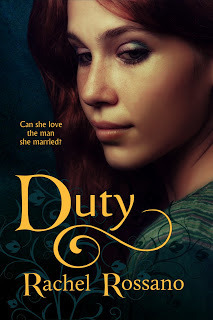
Amazon
I will leave it up to you whether this meeting was "adorable, entertaining, or amusing."
~~~~~
The vargar gate stood open and the portcullis loomed in sharp glory above the opening. We passed beneath the gatehouse without challenge though many armed men moved about with purpose and the gate master nodded us through. Riding through the shadow of the gate and into the spring sunlight, we entered a large stone-paved courtyard full of children. They scattered before us, screaming, laughing, and scrambling about.
I pulled my horse to an abrupt halt, which he protested with a snort. Or perhaps he did it in response to a red-headed urchin who dashed up and regarded my horse solemnly through eyes as deep brown as the animal’s hide.
“Your horse is tired.”
Her hair identified her as one of Rathenridge’s daughters, but beyond that, I could not place her.
“He is.” I could think of nothing else to say.
“Arietta!” A young woman barely taller than the child appeared at her side. Laying a protective hand on the girl’s shoulder, the woman glanced at me. All I caught was a flash of dark eyes before she turned to address the child, leaving me to admire the curve of her cheek and the fall of glossy brown hair over her shoulder. “Ari, you cannot walk up to strange horses like that. It isn’t safe.”
“But the horse is tired.” Arietta tried to shrug away the woman’s hand.
“I think the man knows that.” The woman’s stage whisper carried clearly in the suddenly quiet courtyard.
Suddenly I realized that I was sitting motionless on my horse while my men waited for the signal to dismount. I gave it impatiently and lowered myself to the ground as well. By the time I turned from my horse, the woman and child were gone. I glanced around only to spot them leaving the courtyard. The woman was shooing the children ahead of her through the wide main door into the keep.
~~~~~
So, is it amusing, adorable, or entertaining?
Thank you for stopping by. For more sweet excerpts for your Saturday, go to http://sweetsatsample.wordpress.com/.
The excerpt from above is from Honor, the sequel to Duty.

Amazon
Published on May 11, 2013 06:34
May 8, 2013
Medieval Word Wednesday - Siege Weapons
[image error]
http://commons.wikimedia.org/wiki/Fil...
In the image above, we can see an illustration of the use of the following two objects.
Definitions from The Scriptorium (http://thescriptorium.co.uk/glossary.php)
trebuchet - siege engine operated by a counterweight
belfry - a mobile wooden tower used to transfer troops onto a wall
The description provided on the source site for the image above describes the machine hurling rocks on the attackers as a catapult, but it looks more like a trebuchet to me. From what I understand (though I am no expert), catapults work on a concept similar to a bow or a spoon when hurling peas across the room (bending and then releasing). The trebuchet uses a swinging counterweight to hurl objects. From what I have read, the trebuchets could throw farther and longer than catapults, which would make them my weapon of choice when attacking a thick castle wall.
Here are two examples for you to compare:
Catapult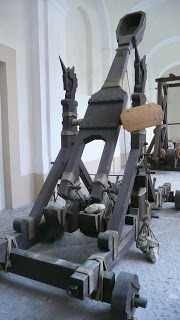 http://en.wikipedia.org/wiki/File:Catapult_1_Mercato_San_Severino.jpg
http://en.wikipedia.org/wiki/File:Catapult_1_Mercato_San_Severino.jpg
Trebuchet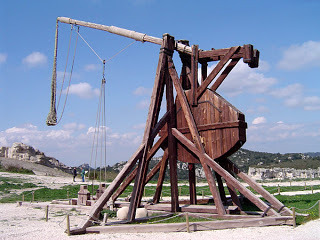 http://commons.wikimedia.org/wiki/File:Trebuchet.jpg
http://commons.wikimedia.org/wiki/File:Trebuchet.jpg
Which do you think is being usedin the picture at the top of the post?
In the image above, we can see an illustration of the use of the following two objects.
Definitions from The Scriptorium (http://thescriptorium.co.uk/glossary.php)
trebuchet - siege engine operated by a counterweight
belfry - a mobile wooden tower used to transfer troops onto a wall
The description provided on the source site for the image above describes the machine hurling rocks on the attackers as a catapult, but it looks more like a trebuchet to me. From what I understand (though I am no expert), catapults work on a concept similar to a bow or a spoon when hurling peas across the room (bending and then releasing). The trebuchet uses a swinging counterweight to hurl objects. From what I have read, the trebuchets could throw farther and longer than catapults, which would make them my weapon of choice when attacking a thick castle wall.
Here are two examples for you to compare:
Catapult
 http://en.wikipedia.org/wiki/File:Catapult_1_Mercato_San_Severino.jpg
http://en.wikipedia.org/wiki/File:Catapult_1_Mercato_San_Severino.jpg
Trebuchet
 http://commons.wikimedia.org/wiki/File:Trebuchet.jpg
http://commons.wikimedia.org/wiki/File:Trebuchet.jpgWhich do you think is being usedin the picture at the top of the post?
Published on May 08, 2013 07:00
May 7, 2013
Finding the Core of your Story
 Available on Amazon
Available on AmazonI have never been one to fall in love with self-help books or writing books, but this one is an exception. It embodies such a great combination of obvious skill on the part of the writer and a fun presentation.
So, if you are a writer, editor, screenwriter, or just someone who likes to read books about writing, this is a great book to pick up. I have already found this book very useful in many ways.
Jordan Smith explains exactly how to get to the core of the story while walking through the steps of writing a logline. He offers plenty of great examples to demonstrate the steps and choices that need to be made. As a writer, I am constantly struggling to describe my books to others. Smith's book helped me hone my pitches and develop taglines for my books. I plan on referring back to the book with each new project I undertake.
As an added bonus, book entertains as it teaches. The author engages the reader as few non-fiction writers do. The result is a pleasant learning experience.
I look forward to picking up more books by Jordan Smith in the future.
Published on May 07, 2013 17:59
May 4, 2013
#SweetSat
Welcome!
This Saturday's Sweet Sample is the first paragraphs of Honor. Three years after the epilogue of Duty, Lord Dentin is traveling through the north eastern regions of Rhynan once again.
 © Pavalache Stelian | Dreamstime Stock Photos
© Pavalache Stelian | Dreamstime Stock Photos
“Owenchance lies over the next rise, my lord.” Rowan, my squire, nodded to where the road disappeared over the hill. “Do you wish for me to send word ahead?”
“No, don’t give them a chance to bar the gate.”
Spring breathed hope into the day. It should have been hard to remain apprehensive when young green leaves bobbed in the breeze over my head. The bright colors of young life kept bursting forth from beneath the melting snow. As typical in the northern regions of Rhynan, the heartiest of the plant life sprang forth when winter barely released its hold on the ground, a wonder that never ceased to amaze me.
Still, despite it being my favorite time of year, turmoil churned in my gut.
Sir Rathenridge’s vargar rising above the half-clothed trees might have added to my ill ease. Relations between him and me were tenuous at best. Something about the man drove me to outbursts of anger beyond any I allowed myself since my father’s death. Aiden’s flippant attitude, theatrics, and unwillingness to remain serious in times of stress raked at my nerves.
Besides he never missed an opportunity to share his acerbic opinion of me. The fact I intended to drop in on his residence unannounced would strain our already unsettled peace. However, I rarely felt anxiety over such things when dealing with others. It was part of my job to manage displeased nobles and gentry.No, my unease had everything to do with my mission. Tomas Dyrease, Earl of Kyrenton, would not love my appearing when I delivered my news.
~~~~~
Did it hook your attention? Do you want to read more?(I am not going to be on my computer much Saturday and Sunday, so I won't be available to approve comments. Please do leave comments, though. They will appear on Monday.)
Thank you for stopping by!
For more Sweet Saturday Samples go tohttp://sweetsatsample.wordpress.com/
If you liked what you read above, you might want to check out the first book in the series, Duty: a novel of Rhynan

Amazon - Nook - Kobo - Smashwords
This Saturday's Sweet Sample is the first paragraphs of Honor. Three years after the epilogue of Duty, Lord Dentin is traveling through the north eastern regions of Rhynan once again.
 © Pavalache Stelian | Dreamstime Stock Photos
© Pavalache Stelian | Dreamstime Stock Photos“Owenchance lies over the next rise, my lord.” Rowan, my squire, nodded to where the road disappeared over the hill. “Do you wish for me to send word ahead?”
“No, don’t give them a chance to bar the gate.”
Spring breathed hope into the day. It should have been hard to remain apprehensive when young green leaves bobbed in the breeze over my head. The bright colors of young life kept bursting forth from beneath the melting snow. As typical in the northern regions of Rhynan, the heartiest of the plant life sprang forth when winter barely released its hold on the ground, a wonder that never ceased to amaze me.
Still, despite it being my favorite time of year, turmoil churned in my gut.
Sir Rathenridge’s vargar rising above the half-clothed trees might have added to my ill ease. Relations between him and me were tenuous at best. Something about the man drove me to outbursts of anger beyond any I allowed myself since my father’s death. Aiden’s flippant attitude, theatrics, and unwillingness to remain serious in times of stress raked at my nerves.
Besides he never missed an opportunity to share his acerbic opinion of me. The fact I intended to drop in on his residence unannounced would strain our already unsettled peace. However, I rarely felt anxiety over such things when dealing with others. It was part of my job to manage displeased nobles and gentry.No, my unease had everything to do with my mission. Tomas Dyrease, Earl of Kyrenton, would not love my appearing when I delivered my news.
~~~~~
Did it hook your attention? Do you want to read more?(I am not going to be on my computer much Saturday and Sunday, so I won't be available to approve comments. Please do leave comments, though. They will appear on Monday.)
Thank you for stopping by!
For more Sweet Saturday Samples go tohttp://sweetsatsample.wordpress.com/
If you liked what you read above, you might want to check out the first book in the series, Duty: a novel of Rhynan

Amazon - Nook - Kobo - Smashwords
Published on May 04, 2013 05:00
May 3, 2013
Word and Deed and the RONE Awards - Votes Needed!
Word and Deed and Duty qualified for the RONE Awards!
This week Word and Deed is competing in Historical Novellas/Short Stories category.
I would be delighted if you would stop over and vote for it. :) Just click on the link below and follow the instructions. Thank you!
http://indtale.com/rone-awards/2012/week-3
For more about the RONE Awards go to http://indtale.com/2012-rone-awards.
Duty: a novel of Rhynan will be looking for votes next week in the Fantasy Novel category.
This week Word and Deed is competing in Historical Novellas/Short Stories category.
I would be delighted if you would stop over and vote for it. :) Just click on the link below and follow the instructions. Thank you!
http://indtale.com/rone-awards/2012/week-3
For more about the RONE Awards go to http://indtale.com/2012-rone-awards.
Duty: a novel of Rhynan will be looking for votes next week in the Fantasy Novel category.
Published on May 03, 2013 07:42



